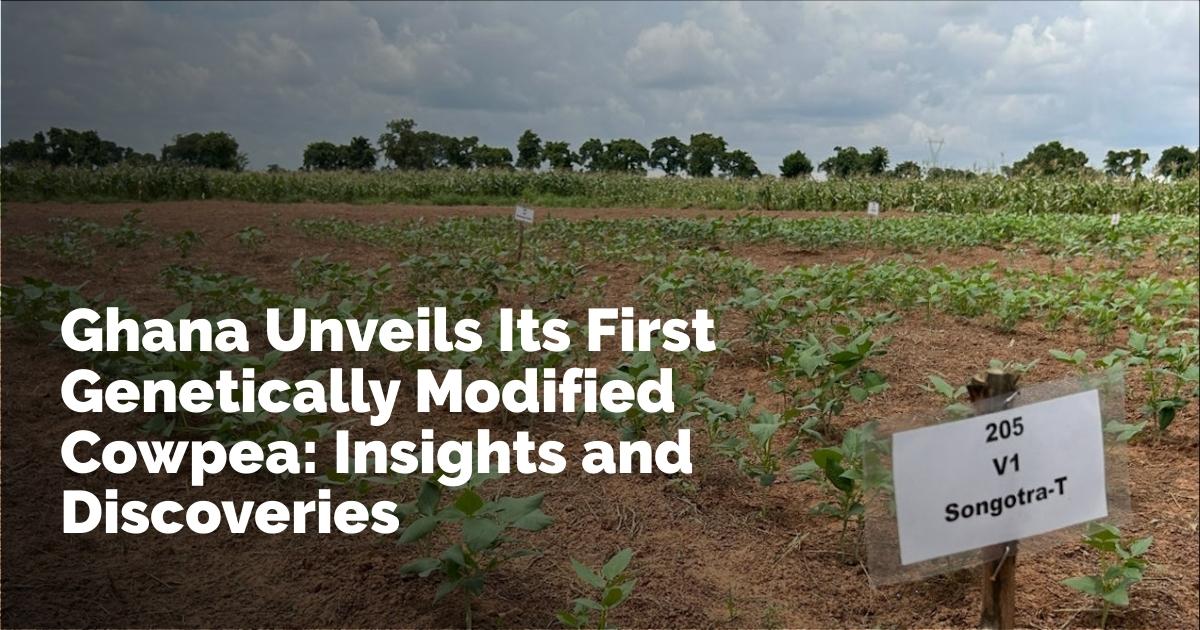Introducing Ghana's First Genetically Modified Crop: The GM Cowpea
In the realm of agricultural innovation, Ghana has emerged as a significant player with the approval of its first genetically modified (GM) crop—the cowpea. This development marks a crucial step in addressing the challenges posed by agricultural pests that have long threatened food security in the region. The specific pest in question is the legume pod borer (Maruca vitrata), notorious for causing yield losses exceeding 80% in cowpea crops across sub-Saharan Africa. Originally hailing from south-east Asia, this insect targets the flowers, pods, and seeds of cowpea (Vigna unguiculata), making it imperative to find a solution beyond conventional methods.
The Problems with Conventional Cowpea Varieties
Cowpea holds a vital place in the agricultural landscape of sub-Saharan Africa, serving as a staple crop. However, conventional varieties of cowpea have shown inadequate resistance to the legume pod borer, leaving farmers dependent on insecticides. This dependency comes with increased costs and introduces environmental and health risks that accompany widespread chemical use. Over the last two decades, a consortium of researchers with expertise in plant biotechnology and affiliations in Ghana, Nigeria, Burkina Faso, Australia, and the United States, have collaboratively worked to tackle this pressing issue.
The Birth of Songotra-T: A Genetically Modified Solution
After extensive research and development efforts, these researchers succeeded in creating a genetically modified cowpea variety named Songotra-T. This variant is resistant to the legume pod borer, representing a significant leap forward in agricultural innovation. Ghana's approval of Songotra-T for commercial release in 2024 marks a historic achievement, being the country's first GM crop endorsement.
This follows the path blazed by Nigeria, which approved the pod borer-resistant cowpea variant in 2019, commercially launched as Sampea 20-T in 2020. The introduction of Songotra-T in Ghana is not just an approval; it signifies a pivotal step in applying advanced biotechnological solutions to enhance food security and agricultural productivity in the region.
Field Trials: Demonstrating the Efficacy of Songotra-T
To ascertain the effectiveness of Songotra-T, researchers conducted field trials in northern Ghana, a key cowpea-producing region characterized by a rain-fed farming system and substantial pest pressure. The trials compared the GM cowpea's performance against three conventional cultivars: the non-GM equivalent Songotra, and two others named Kirkhouse-Benga and Wang-Kae.
The trials employed robust, replicated experimental designs across four different locations within Ghana’s cowpea-growing belt. Statistical methods ensured the accuracy and reliability of data collection and subsequent interpretation. The results were promising: Songotra-T achieved an average grain yield of 2,534 kg per hectare, surpassing the yields of the conventional varieties, which ranged between 1,414 kg/ha and 1,757 kg/ha.
An economic analysis conducted by the research team underscored the potential financial benefits. Songotra-T demonstrated a return on investment of 464%, illustrating the substantial economic advantage and viability for smallholder farmers who typically operate under resource constraints.
Environmental and Health Benefits
An important aspect of the field trials was evaluating the environmental and health impacts of introducing Songotra-T. The findings indicated that the GM cowpea could reduce insecticide use by 80%, significantly lowering production costs and mitigating health risks for both farmers and consumers. This reduction in chemical usage is crucial in preserving beneficial insect populations, such as spiders and ladybird beetles, which naturally control pests.
The broader environmental implications of Songotra-T reinforce its sustainability as an alternative strategy to traditional pest management. The economic benefits accrued from insecticide savings and increased yields further bolster the crop's appeal. While the specific pricing of GM seeds remains to be established by local seed companies, it is anticipated that the reduced costs in chemicals and increased crop yields will offset any potential rise in seed costs.
Implications for Food Security in Ghana
The successful development and planned commercialization of Songotra-T align with global trends in agricultural biotechnology, where GM varieties like maize, soybean, and cotton have been successfully cultivated worldwide. These developments hold promise for addressing food insecurity in Ghana by enhancing the yield of a crucial staple crop.
Navigating the Acceptance and Regulation Landscape
Ghana's decision to commercialize Songotra-T speaks volumes about its commitment to embracing agricultural biotechnology. This approval serves as a powerful counter to earlier skepticism about whether the country would fulfill its regulatory green light issued in 2022. At the time, there were apprehensions related to regulatory hurdles and the public's acceptance of GM crops.
Despite concerns from anti-GM groups, the World Health Organization supports the safety of GM foods currently available on the international market, asserting they have undergone rigorous safety assessments and do not pose health risks to consumers. Ghana's approval underscores the potential for African nations to make informed decisions about agricultural biotechnology tailored to their specific needs and contexts.
The Path Forward: Successful Adoption of Biotechnology
While the introduction of Songotra-T is a landmark achievement, it also highlights the need for effective seed production and distribution systems to ensure the technology reaches Ghanaian farmers at scale. Bridging the gap between innovation and tangible agricultural impact may require continued support from international development partners. Such involvement can ensure the widespread adoption of GM crops and address food security issues effectively.
Ultimately, the success of Songotra-T depends on the concerted efforts of Ghana's policymakers and collaborative initiatives with global partners. This endeavor not only paves the way for a resilient agricultural future but also sets a precedent for other countries in the region to explore and adopt science-backed solutions to their agricultural challenges.
Involvement from key research institutions, including the African Agricultural Technology Foundation and the Donald Danforth Plant Science Center, further illustrates the collaborative efforts necessary to harness biotechnology's potential, driving agricultural progress and improving livelihoods across sub-Saharan Africa.
출처 : Original Source

